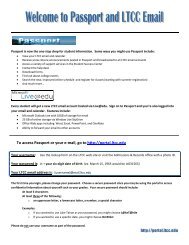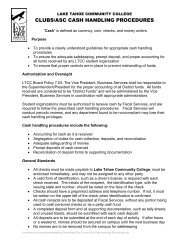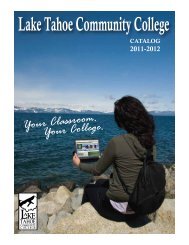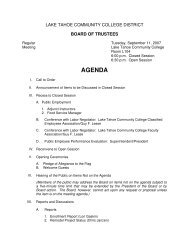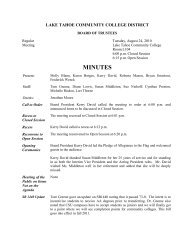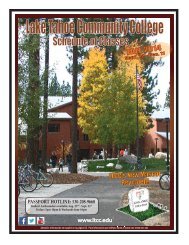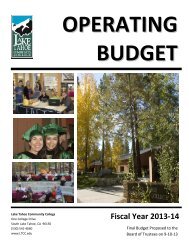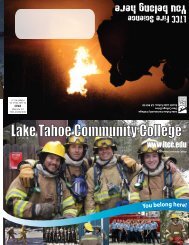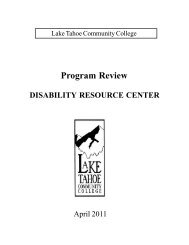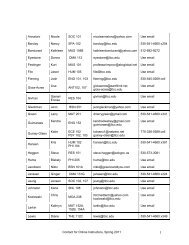View the 2010-2011 Catalog (4 MB) - Lake Tahoe Community College
View the 2010-2011 Catalog (4 MB) - Lake Tahoe Community College
View the 2010-2011 Catalog (4 MB) - Lake Tahoe Community College
- No tags were found...
Create successful ePaper yourself
Turn your PDF publications into a flip-book with our unique Google optimized e-Paper software.
COUNSELING128LTCC CATALOG <strong>2010</strong>-<strong>2011</strong>COU 120 INTRODUCTION TO ALCOHOL ANDDRUG STUDIESLecture 4, Lab 0, Units 4This is an introductory course for persons interested in any area ofhuman services who wish to increase <strong>the</strong>ir knowledge of substanceabuse (including alcohol) in our society. This course will cover various<strong>the</strong>ories of substance abuse and alcoholism, identification signs, andsymptomology. Treatment resources will be examined and myths ofuse will be dispelled. Students will learn a pragmatic approach toworking with <strong>the</strong> using population.Transfers to CSU, UNRCOU 121 THE PHYSICAL, CHEMICAL, ANDBEHAVIORAL EFFECTS OF ALCOHOL ANDDRUGSLecture 4, Lab 0, Units 4This course provides a comprehensive examination of how drugs aremetabolized, as well as <strong>the</strong>ir effects on <strong>the</strong> central nervous systemand on behavior. Additional topics include <strong>the</strong> addiction process, <strong>the</strong>dynamics of tolerance and withdrawal, <strong>the</strong> medical consequences ofalcohol and drug abuse, fetal alcohol syndrome, effects on humansexuality, and <strong>the</strong> nutritional aspects in both <strong>the</strong> active phases ofchemical dependence and in recovery.Transfers to CSU, UNRCOU 122 REHABILITATION AND RECOVERYFROM ALCOHOL AND DRUG ABUSELecture 4, Lab 0, Units 4This course provides <strong>the</strong> knowledge and skills required to helpchemically dependent clients in <strong>the</strong>ir treatment and recovery fromalcohol and drug abuse. Topics covered include techniques for clientassessment and evaluation, treatment planning, case management,aftercare and relapse prevention, detoxification, twelve-step supportgroups, and <strong>the</strong>rapeutic communities. Group, individual, and family<strong>the</strong>rapy models of counseling are introduced and diversity issuesin chemically dependent clients and legal and ethical issues areincluded. Students will be challenged to examine <strong>the</strong>ir existing ideasabout dependency disorders and will conduct mock interviews withrecovering people.Transfers to CSU, UNRCOU 123 ALCOHOL AND DRUG PREVENTIONAND EDUCATIONLecture 4, Lab 0, Units 4This course reviews <strong>the</strong> history, <strong>the</strong>ories, models, and state-of-<strong>the</strong>artapproaches to <strong>the</strong> addiction prevention field. Additional topicsinclude prevention programs; activities appropriate for <strong>the</strong> individual,community, campus, parent/family and work site; public policiesand media/information-dissemination; ethnic and cultural specificapproaches; and environmental risk reduction.Transfers to CSU, UNRCOU 124 GROUP LEADERSHIP AND PROCESSLecture 4, Lab 0, Units 4This course provides an intensive introduction to <strong>the</strong> experience ofgroup <strong>the</strong>rapy with emphasis on leader facilitation skills and analysisof group dynamics. Students will learn <strong>the</strong> fundamentals of groupleadership by examining problems of communication, trust building,effective emotional responses, professional boundaries and personalgrowth. The emphasis will be on <strong>the</strong> group process as a means ofchanging behavior and attitude.Transfers to CSU, UNRCOU 125 COUNSELING THE FAMILY OFADDICTED PERSONSLecture 4, Lab 0, Units 4This course examines methods of assisting significant o<strong>the</strong>rs whoselives are affected by addiction. The profile of addicted persons anddynamics such as denial, codependency, and enabling on <strong>the</strong> partof family, employer, and friends will be covered. Intervention andtreatment skills in counseling families are learned and practicedthrough class exercises.Transfers to CSU, UNRCOU 126 INTERVENTION AND REFERRALTECHNIQUESLecture 4, Lab 0, Units 4This course is designed to introduce <strong>the</strong> Addiction Studies studentto <strong>the</strong> <strong>the</strong>ory, purpose, and application of <strong>the</strong> formal interventionprocess. Topics covered include crisis intervention, treatment planning,securing resources for clients, record documentation, screening, datacollection, implementation of treatment plans, and aftercare.Transfers to CSU, UNRCOU 127 DUAL DISORDERS AND MENTALHEALTH ISSUESLecture 4, Lab 0, Units 4This course provides counseling techniques appropriate forparaprofessionals in mental health, corrections, and substance abusecounseling. Students integrate <strong>the</strong> often divergent philosophies ofmental health and substance abuse treatment towards <strong>the</strong> developmentof an integrated treatment approach. Students will be presented withmental health approaches that are effective with substance abusingclients and substance abuse approaches that are effective with mentallyill clients.Transfers to CSU, UNRCOU 131 SPECIAL TOPICSUnits 1-4This course is designed to meet <strong>the</strong> needs of students for studies inareas of special interest. Topics and credit will vary from quarter toquarter and will be included under this cover title published in <strong>the</strong>schedule for <strong>the</strong> quarter in which <strong>the</strong> course will be offered.Transfers to CSUCOU 132 OCCUPATIONAL WORK EXPERIENCELecture 0, Lab 0, Units 1-6Occupational Work Experience is for students who are employed injobs related to <strong>the</strong>ir educational or occupational goals. This programextends knowledge gained in <strong>the</strong> classroom to <strong>the</strong> workplace, helpsstudents identify new and challenging objectives at work, andencourages professional growth and advancement.Transfers to CSUCOREQUISITE: Students must be available to work or volunteer 4 to 40 hoursper week for an approved business and must have an application on file each quarterenrolled.REPEATABILITY: May be repeated up to a total of twenty-four (24) units, six unitsmaximum per quarter.



